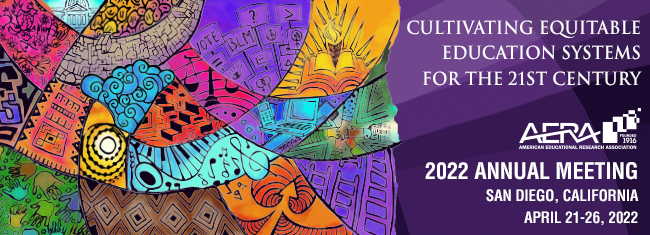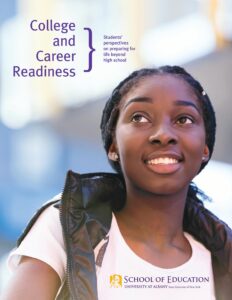NYKids at the 2022 AERA Conference
By Aaron Leo, Kristen Wilcox, and Jessie Tobin
This week, NYKids Graduate Assistant and UAlbany Educational Policy and Leadership doctoral student Jessie Tobin presents findings from NYKids’ College and Career Readiness Study on peer relationships at the American Educational Research Association’s Annual (AERA) Conference.
The 2022 AERA Conference: Cultivating Equitable Education Systems for the 21st Century
AERA’s Meeting Theme this year calls for educators to focus their attention on “Cultivating Equitable Education Systems for the 21st Century”. Though we may not yet understand the long-term fallout of the pandemic on youth across the country, AERA President Nasir urges educators, researchers, and policymakers to view this moment as a powerful opportunity to rebuild an educational system which is focused on social justice and equality. As Nasir writes,
“We must move towards the reimagining and creation of systems that view opportunity and education as a human right.”

To this end, we at NYKids look forward to presenting research findings on the important role of peer relationships at AERA alongside other scholars.
NYKids’ Findings on Peer Relationships
As we have noted in previous blogs, NYKids’ study of college and career readiness in seven positive outlier schools across New York State occurred in two phases. The first phase focused on the programs, practices, and policies that educators utilized to support students in achieving a Regents or Advanced Regents diploma. In our second phase, we returned to two of the positive outlier schools and conducted interviews and focus groups with students to better understand their perspectives and experiences.
 Among our various findings, we noted the strong emphasis on peer relationships – both among educators and young people. In particular, we found several important themes characterized relationships among peers and what supports those relationships in the positive outlier schools that participated in our study:
Among our various findings, we noted the strong emphasis on peer relationships – both among educators and young people. In particular, we found several important themes characterized relationships among peers and what supports those relationships in the positive outlier schools that participated in our study:
What Relationships Look Like in Positive Outliers:
- Both student and educator relationships were characterized by a high value placed on collaboration and cooperation
- Relationships among peers were described as relatively egalitarian, bully-free, and lacking popular hierarchies
How Peer Relationships are Supported in Positive Outliers:
- Thoughtfully-crafted schoolwide mentoring programs provided opportunities for students of different ages and interests to develop positive relationships with one another
- Leadership opportunities abounded for students with various interests (not restricted to a limited few) and many of these were created and implemented by youth themselves.
- Extracurricular programs were designed to provide a variety of opportunities for peer relationships to thrive by introducing youth to peers they may not have otherwise had contact while also making connections between the school and wider community
Because peer relationships are a crucial influence on youths’ academic performance and social-emotional well-being, these findings have significance for educators and policymakers particularly now as young people emerge from the social distancing of the COVID-19 pandemic.
The AERA conference provides an important venue to highlight New York’s positive outlier school findings and learn from others in the common pursuit to better understand and address educational and social inequities in New York state and beyond.
Please see the full presentation available here on our website, and stay tuned for live updates on the conference from our Twitter, Instagram, and Facebook pages.
As always, we thank you for your interest in NYKids and encourage you to reach out with questions or comments at nykids@albany.edu.
